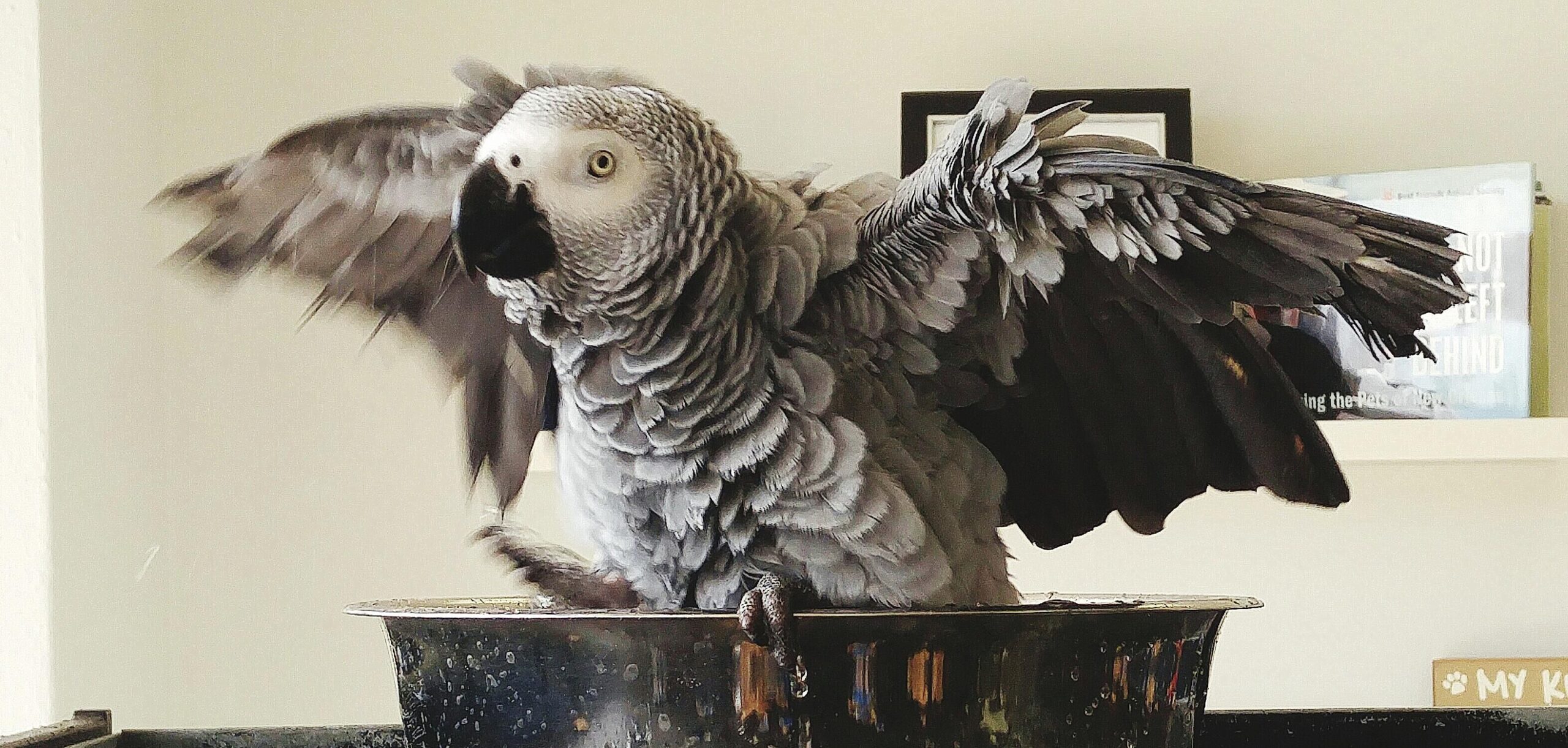Adopting an african grey parrot requires proper research and understanding for first-time owners. Here are tips and tricks to make the process easier.
Owning a pet parrot can be a rewarding experience. African grey parrots, in particular, are known for their affectionate and intelligent nature. However, adopting and caring for one requires responsibility and knowledge. As a first-time owner, it’s important to be aware of specific considerations for this species, such as their special dietary needs and socialization requirements.
In this article, we will provide tips and tricks to help ensure a successful adoption and long-term bond with your african grey parrot. By following these guidelines, you can provide a happy and healthy life for your new feathered friend.

Credit: www.thehappychickencoop.com
Understanding African Grey Parrots
African grey parrots are one of the most intelligent and fascinating birds out there; however, they require a lot of care and attention. Before you decide to bring one into your home, here are some key points to consider:
Characteristics And Behavior Of African Grey Parrots
African grey parrots are medium-sized birds with a sleek grey feather coat. They are known for their distinctive red tail feathers and black beaks. Here are some key characteristics of african grey parrots:
- Average lifespan is 50-60 years; can live up to 80 years.
- Can weigh between 10-20 ounces and reach up to 13 inches in length.
- Have the intelligence and cognitive understanding similar to that of a 5-year-old human child.
- Can imitate human speech and sounds, including words and sentences of up to several hundred words.
- Can show signs of emotional intelligence such as empathy and understanding of other’s emotions.
The Advantages And Disadvantages Of Owning An African Grey Parrot
Like any pet, african grey parrots come with both pros and cons. Here are the advantages and disadvantages to consider:
Advantages:
- African grey parrots have an incredible talent for learning words and phrases. This means that you can teach them to speak and communicate with you.
- They can be incredibly affectionate and form strong bonds with their owners. African grey parrots crave attention and can make affectionate companions.
- They are intelligent creatures and enjoy playing with toys and engaging in mental stimulation activities.
Disadvantages:
- African grey parrots require a lot of attention and commitment. You must have plenty of time to spend with them in order to maintain a happy and healthy relationship.
- They can become destructive if they are not adequately stimulated or bored.
- They require a specific diet that includes a variety of fresh fruits, vegetables, and specialized pellets. This can be expensive and time-consuming.
Preparing For The Responsibilities Of Owning An African Grey Parrot
Owning an african grey parrot is a big responsibility and requires a lot of commitment. Here are some of the responsibilities that come with owning an african grey parrot:
- Provide a stable and comfortable environment that includes plenty of space to move around in and a variety of toys to play with.
- Ensure they have a healthy, fresh diet consisting of a variety of fruits, vegetables, and specialized pellets.
- Provide plenty of socialization, attention, and mental stimulation activities to keep them happy and mentally stimulated.
- Find a veterinarian that specializes in exotic birds and schedule regular check-ups.
By understanding the characteristics and behaviors of african grey parrots, as well as the advantages and disadvantages of owning one, you can make an informed decision about whether or not you are ready for the challenges and joys that come with welcoming one into your home.
Finding The Right African Grey Parrot
Adopting an african grey parrot could be one of the exciting experiences for bird lovers. These birds are known for their intelligence, social skills, and adorable demeanor, making them ideal pets for all. However, it is essential to find the perfect african grey parrot that suits your lifestyle and home environment.
Choosing A Reputable Breeder Or Adoption Agency
When it comes to adopting an african grey parrot, it is crucial to choose a reputable breeder or adoption agency. Here are key points to consider:
- Research and check reviews about the breeder or agency
- Ask essential questions about the bird, breeding, and care
- Ensure they have veterinarian certification for breeding and selling birds
- Make sure the breeder or agency provides health check reports for the bird
- Ask for a copy of the bird’s hatch certificate to confirm the bird’s breed
Understanding The Cost Of Acquiring An African Grey Parrot
Before you acquire an african grey parrot, it is essential to understand the cost involved. Here are some of the primary costs:
- The bird’s price, which can range from $1,000 to $3,000, depending on the color, age, and breed of the bird
- The cost of the cage, toys, and food, which can cost between $500 to $1,000 initially, depending on the quality and size of the products
- The continuing cost of food, vet bills, toys, and supplements that range from $300 to $500 year-round.
Selecting A Healthy Parrot
Selecting a healthy african grey parrot can prevent future health problems. How do you choose a healthy parrot? Here are the key points to consider:
- Check the bird’s eyes, which should be bright with no discharge
- Look at the bird’s feathers, which should be shiny and uniform in color
- Check the bird’s feet and legs, which should not have any swelling or injuries
- Observe the bird’s behavior and temperament, which should be active and not lethargic or aggressive to humans or other birds
- Request the breeder or agency provide you with a health check report from their veterinarian
Finding the perfect african grey parrot is crucial for the successful adoption and enjoyment of these intelligent birds. By choosing a reputable breeder, understanding the costs involved, and selecting a healthy parrot can ensure the positive experience of adopting an african grey parrot.
Preparing Your Home For An African Grey Parrot
Adopting An African Grey Parrot: Expert Tips For New Owners
If you’re considering adopting an african grey, congratulations! These intelligent birds make amazing companions, with their ability to learn a wide variety of words and phrases and their amusing personalities. However, before bringing your new feathered friend home, you’ll need to prepare your home to meet their needs.
Here are some expert tips.
Creating A Safe And Stimulating Environment For Your Parrot
- Make sure to remove any toxic houseplants from your home, as african greys are known for chewing on various greenery. Some common toxic plants include avocado, oleander, and lilies.
- Keep all electrical cords, as well as any sharp or dangerous objects, out of reach. African greys have a curious nature, and they love to explore and chew things they shouldn’t.
- Provide your bird with plenty of toys and activities to keep their mind engaged and prevent boredom. Rotate their toys every few weeks to keep things fresh.
- Be sure to provide plenty of natural light and fresh air. African greys thrive in a bright, airy space with good ventilation.
- Establish ground rules with your family members and guests to ensure that your bird is safe and well-cared for. For example, make sure that no one leaves doors or windows open, as african greys are quick flyers.
Providing The Right Type Of Birdcage And Accessories
- Choose a cage that is the appropriate size for your bird. As a general rule, the cage should be at least twice the bird’s wingspan in length, width, and height.
- Look for a cage with horizontal bars that are close together to prevent the bird from escaping or getting stuck.
- Make sure that the birdcage is made of non-toxic materials, and avoid any cages with lead or zinc components.
- Provide your bird with perches of various sizes and textures to keep their feet and beak healthy.
- Include toys, such as swings, ropes, and bells, to keep your bird entertained and mentally stimulated.
Choosing The Right Location For Your Birdcage
- Place the birdcage in a room where the family spends most of their time. African greys are social birds and crave interaction.
- Avoid placing the birdcage in a drafty or isolated area, which can be stressful for your bird.
- Be mindful of temperature fluctuations, as african greys thrive in a consistent environment.
- Keep your birdcage away from the kitchen and other noisy areas of your home to prevent your bird from getting stressed out.
With these tips, your home will be ready to welcome your new african grey companion. Just remember to show patience and love as your bird adapts to their new surroundings, and you’ll enjoy a loving relationship with your intelligent and beautiful pet.
Feeding And Caring For Your African Grey Parrot
Adopting an african grey parrot can be a fulfilling experience. Feeding and caring for them is one of the most important aspects of raising a healthy african grey parrot. Here, we’ll discuss some expert tips for new owners to help ensure their pet’s health and well-being.
Understanding The Nutritional Needs Of An African Grey Parrot
• african grey parrots require a balanced diet that includes fruits, vegetables, seeds, and pellets.
• limit the intake of fatty and sugary foods as they can cause obesity, which can lead to various health problems.
• consider adding vitamin supplements to their diet to ensure they receive proper nutrition.
Providing Exercise And Socialization For Your Parrot
• african grey parrots need exercise to maintain their physical health and mental stimulation.
• allow your parrot to fly or climb outside of its cage for at least two hours a day.
• socialization is essential for your african grey parrot and can be done by spending time with them daily. Play and talk with them or take them outside to expose them to new environments and experiences.
Maintaining Proper Hygiene And Grooming
• cleaning and maintaining the parrot’s cage is essential for their overall health.
• regularly clean the food and water bowls, toys, and perches to prevent the growth of bacteria and other harmful organisms.
• groom your parrot’s feathers by trimming their wings and nails. Overgrown wings and nails can cause injuries, and their beak should be trimmed to prevent overgrowth.
Adopting an african grey parrot requires patience, responsibility, and dedication. By following these expert tips, you can ensure that your parrot leads a happy and healthy life. Remember, the key to providing the best care for your african grey parrot is to understand their unique needs, provide them with proper food, exercise, and hygiene, and socialize with them regularly.
Addressing Common Health Concerns
Recognizing Signs Of Illness In Your African Grey Parrot
As a new african grey parrot owner, one of the most crucial aspects of their care is identifying health problems early and taking immediate action. Unfortunately, birds are skilled at hiding their illnesses, and it can be difficult to recognize symptoms of serious health conditions.
Here are some signs to look out for:
- Lethargic behavior
- Lack of appetite or difficulty eating
- Discolored feathers
- Fluffed or ruffled feathers
- Breathing difficulties
- Runny nose or eyes
- Vomiting or diarrhea
If you notice any of these symptoms, it’s essential to seek veterinary care right away. Early diagnosis and treatment are crucial in ensuring your parrot’s best chance for a full recovery.
Understanding Common Health Problems And Their Treatments
While african grey parrots are generally healthy pets, they are still susceptible to several common health problems. Knowing what to watch out for and how to treat them can help you provide your feathered friend with the appropriate care. Here are some common health problems:
- Feather plucking: This can occur due to stress, boredom, or health problems. Treating feather plucking requires identifying the underlying cause and addressing it.
- Psittacosis: This is a bacterial infection that can cause severe respiratory problems. Psittacosis requires prompt veterinary care and is treatable with antibiotics.
- Beak and feather disease: This is a viral infection that can cause beak and feather abnormalities. While a vaccine is available, the disease has no cure, and affected birds typically need lifelong supportive care.
Knowing When To Seek Professional Veterinary Care
As a responsible pet owner, it’s crucial to know when your african grey parrot requires professional veterinary care. Here are some instances where you should seek veterinary attention immediately:
- Any change in behavior or appetite
- Fluffed or ruffled feathers
- Breathing difficulties
- Vomiting or diarrhea
- Bleeding or broken blood feathers
- Trauma or injury
Bird health problems can quickly escalate, making early intervention critical. Do not wait until your bird is seriously ill before seeking help from a veterinarian. A regular check-up with an avian veterinarian every six months greatly increases the chances of detecting early signs of diseases-which is key to preventing serious health problems.
Adopting an african grey parrot is a significant responsibility, and their owners have an essential role in their health and well-being. With proper care, attention, and awareness, these intelligent birds can live happy and healthy lives as a part of your family.
Frequently Asked Questions Of Adopting An African Grey Parrot: Tips And Tricks For First-Time Owners
What Should You Consider Before Adopting An African Grey Parrot?
Before adopting an african grey parrot, consider if you have the time, space and resources to care for it. The commitment to owning one is high, given their lifespan, diet, and socialization needs.
What Kind Of Environment Is Best For African Grey Parrots?
African grey parrots thrive in environments that are clean, well-lit, and have access to fresh air. Ensure that their enclosure is roomy, contains toys for mental stimulation, and is free from toxins like lead and zinc.
How Can You Bond With Your African Grey Parrot?
To bond with your african grey parrot, spend time interacting with them daily, through talking, singing, playing games, and training. Teaching them tricks strengthens your bond and improves their cognitive abilities.
What Are The Nutritional Requirements Of African Grey Parrots?
African grey parrots require a balanced diet that includes pellets, fresh fruits, vegetables, and nuts, and seeds in moderation. Avocado and chocolate are toxic to them.
How Can You Prevent Behavioral Problems In African Grey Parrots?
Prevent behavioral problems in african grey parrots by providing them with sufficient mental and physical enrichment, socializing with them often, being consistent with training, and seeking professional help if necessary.
Conclusion
As a first-time owner, adopting an african grey parrot can be an exciting and fulfilling experience. While it may seem daunting at first, with proper research and preparation, you can ensure a happy and healthy life for your feathered friend.
Start by providing a spacious and stimulating environment, a balanced diet, and plenty of attention and socialization. Consistency, patience, and positive reinforcement are key in establishing a strong bond with your parrot. Regular vet check-ups and proper grooming are also important in maintaining their physical and mental well-being.
Remember that african grey parrots are intelligent and sensitive creatures, and it is our responsibility to provide them with a loving and caring home. By following these tips and tricks, you can enjoy a lifelong companionship with your african grey parrot.
Latest Posts
The Ultimate List: Top 8 Best Birdwatching Podcasts for Avid Birders
Looking for the top birdwatching podcasts? Here are the eight best options to tune into today! Birdwatching can be a thrilling, immersive experience that brings...
Stop Squirrels in Their Tracks: 10 Effective Ways to Safeguard Your Bird Feeder Pole
To prevent squirrels from climbing your bird feeder pole, use squirrel baffles and slippery poles. Here are ten effective ways to keep squirrels from stealing bird food and damaging bird feeders. ...


